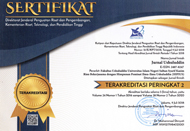Intertextual Reading of Qisas in Q.S. Al-Maidah: 32–33: A Comparative Analysis of Islamic Scholars and Orientalists
Abstract
Keywords
Full Text:
PDFReferences
Abādī, Muḥammad Syams Al-Ḥaqq. ‘Awn Al-Ma’būd. Vol. 7. Dār Al-Fikr, 1995.
Affani, Syukron. “Diskursus Munāsabah: Problem Tafsīr Al-Qur’ān Bi ’L-Qur’ān.” Jurnal Theologia 28, No. 2 (20 Februari 2018): 391–418. https://doi.org/10.21580/Teo.2017.28.2.1443.
Aini, Adrika Fitrotul, Dan Asep Nahrul Musadad. “Late Antiquity Context and Microstructure Analysis as a Counter to Skepticism of the Originality of the Qur'anic Text: Reflections on the Thought of Angelika Neuwirth.” Suhuf 10, No. 1 (8 September 2017): 173–92. https://doi.org/10.22548/Shf.V10i1.249.
Al-’Arabi, Abu Bakr Ibn. Al-Nasikh Wa Al-Mansukh Fii Al-Qur’an Al-Karim. Editing Al-Syeikh Zakariyya ’Umayrat. 5 Ed. Lebanon: Dar Al-Kotob Al-Ilmiyah, 2014.
Al-Baghawi, Abu Muhammad Al-Husain Bin Mas’ud. “Ma’alim Al-Tanzil Fii Tafsir Al-Qur’an.” In 5, 91. Beirut: Dar Ihya’ Al-Turas Al-’Araby, 2000.
Al-Bayḍāwī, Nāṣir Al-Dīn ‘Abdullāh. Anwār Al-Tanzīl Wa Asrār Al-Ta’wīl. Vol. 1. Beirut: Dār Ṣādir, 2001.
Al-Biqa’i, Ibrahim Bin ’Umar. Nazm Al-Durar Fi Tanasub Al-Ayat Wa Al-Suwar, Jilid 2. Beirut: Dar Al-Kutub Al-Il’miyyah, 1995.
Al-Jurjani, Ali Bin Muhammad. Kitāb Al-Ta’rīfāt. 1 Ed. Lebanon: Dār Al-Kutub Al-‘Ilmiyyah, 1983.
Al-Qazwiniy, Muhammad Bin Yazid. Sunan Ibn Majah. Beirut: Dar Al-Fikr, N.D.
Al-Qurtubiy, Muhammad Bin Ahmad. Al-Jami’ Li Ahkam Al-Qur’an, Jil. 4. Kairo: Dar Al-Kutub Al-Misriyyah, 1964.
Al-Razi, Fakhruddin. Mafatih Al-Ghaib. Cet. Iii. Beirut: Dar Ihya’ Al-Turas Al-’Araby, 2000.
Al-Shabuni, Muhammad ’Ali. “Rawai’ Al-Bayan Fii Tafsir Al-Ayat Al-Ahkam,” 2:590. Beirut: Al-Maktabah Al-’Ishriyyah, 2017.
Al-Suyūṭiy, Jalāluddīn. Al-Itqān Fi ’Ulum Al-Qur’ān. 7 Ed. Lebanon: Dar Al-Kotob Al-Ilmiyah, 2019.
———. Lubāb Al-Nuqūl Fī Al-Asbāb Al-Nuzūl. Lebanon: Dar Al-Kotob Al-Ilmiyyah, 2019.
Al-Sya’rawiy, Muhammad Mutawalliy. Tafsir Al-Sya’rawiy. Mesir: Matabi’ Akhbar Al-Yawm, 1997.
Al-Ṭabari, Muhammad Bin Jarir. Jami’ Al-Bayan Fi Ta’wil Al-Qur’an. Vol. 8. Beirut: Mu’assasah Al-Risalah, 2000.
———. Jami’ Al-Bayan Fi Ta’wil Al-Qur’an. Vol. 3. Beirut: Mu’assasah Al-Risalah, 2000.
———. Jami’ Al-Bayan Fi Ta’wil Al-Qur’an. Vol. 14. Beirut: Mu’assasah Al-Risalah, 2000.
———. Jami’ Al-Bayan Fi Ta’wil Al-Qur’an. Vol. 6. Beirut: Mu’assasah Al-Risalah, 2000.
Al-Żahabi, Muḥammad Husayn. Al-Tafsīr Wa Al-Mufassirūn. 1 Ed. Vol. 1. Kairo: Maktabah Wahbah, 2014.
Angelika, Neuwirth. “Locating The Qur’an In The Epistemic Space Of Late Antiquity.” Ankara Üniversitesi İlahiyat Fakültesi Dergisi 54, No. 2 (2013): 189–203. https://doi.org/10.1501/Ilhfak_0000001396.
Asnawi, Aqdi Rofiq, Husein Aziz, Dan Achmad Murtafi Haris. “Investigating Cohesiveness Of Qs. Al-Mā’idah: A Review On Michel Cuypers Implementation Of Semitic Rhetorical Analysis (Sra).” Journal of Studies in Qur'anic and Hadith Sciences 23, No. 1 (2022). https://doi.org/10.14421/Qh.2022.2301-03.
Āsyūr, Muḥammad Al-Ṭāhir. Al-Taḥrīr Wa Al-Tanwīr. Al-Maktabah Al-Syāmilah. Vol. 30. Tunisia: Ad-Dar At-Tunisiah Li An-Nasyr, 1984.
Bik, Muhammad Al-Khudariy. Tarikh Al-Tasyri’ Al-Islamiy. Beirut: Dar Al-Kutub Al-Il’miyyah, 2013.
Cuypers, Michel. Fi Nazm Surah Al-Maidah, Terj ’Amr ’Abd Al-’Ati Salih. Kairo: Dar Al-Masyriq, 2014.
Danby, Hebret. The Mishnah, Terj Hebret Danby. 1 Ed. New York: Oxford University Press, 1933.
Darwazah, M. Izzat. Al-Tafsir Al-Hadits. Al-Maktabah Al-Syāmilah. Vol. 9. Kairo: Dar Ihya Al-Kutub Al-’Arabiyah, 1971.
Darwazah, Muhammad ’Izzah. Al-Tafsir Al-Hadits. Al-Maktabah Al-Syāmilah. Vol. 3. Kairo: Dar Ihya Al-Kutub Al-’Arabiyah, 1971.
Geiger, Abraham. Judaism And Islam, Translated By Member Of The Ladies League. New York: Madras, 1898.
Hijazi, Muhammad Mahmud. Al-Waḥdah Al-Mauḍū’iyyah Fī Al-Qur’ān Al-Karīm. Mesir: Dār Al-Kutub Al-Hadīṡah, 1970.
Joseph Benzion Witztum. “The Syriac Milieu Of The Quran : The Recasting Of Biblical Narratives.” Princeton University, 2011.
Lai, Lembaga Alkitab Indonesia. Alkitab Deuterokanonika. Lembaga Alkitab Indonesia, 2019. https://www.bible.com/id/bible/306/.
Lpmq, Lajnah Pentashih Mushaf Al-Qur’an. “Qur’an Kemenag.” Kementerian Agama Ri, 2022. https://quran.kemenag.go.id.
Mansur, Ali. “People of the Book in the Qur'an: Fazlur Rahman's Model of Interpretation." In Contemporary Qur'anic Studies: New Discourses on Various Interpretive Methodologies, Editing Abdul Mustaqim Dan Sahiron Syamsudin, 1 Ed. Yogyakarta: Pt. Tiara Wacana Yogya, 2002.
Miles, Matthew B., A. Michael Huberman, Dan Johnny Sardana. Qualitative Data Analysis: A Methods Sourcebook. 3 Ed. Washington: Sage Publication, 2014.
Mustaqim, Abdul. Shifting Tafsir Epistemology. Editing Oleh Saifuddin Zuhri Qudsy. 1 Ed. Yogyakarta: Pustaka Pelajar, 2008.
Neusner, Jacob. The Way Of Torah An Introduction To Judaism. 6 Ed. New York: Wadsworth Publishing Company, 1997.
Neuwirth, Angelika. “Early Meccans Suras: Poetic Prophecy.” In The Qur’an: Text And Commentary, Volume 1. New Haven And London: Yale University Press, 2022. https://doi.org/10.2307/J.Ctv2vvsx24.
———. “Orientalism In Oriental Studies? Qur’anic Studies As A Case In Point.” Journal Of Qur’anic Studies 9, No. 2 (Oktober 2007): 115–27. https://doi.org/10.3366/E1465359108000119.
———. Scripture, Poetry, And The Making Of A Community: Reading The Qur’an As A Literary Text. Oxford: Oxford University Press, 2014.
———. The Qur’an And Late Antiquity, Translated By Samuel Wilder. New York: Oxford University Press, 2019. https://doi.org/10.1093/oso/9780199928958.001.0001.
———. The Qur’an And Late Antiquity: A Shared Heritage. Oxford University Press, 2019. https://doi.org/10.1093/oso/9780199928958.001.0001.
Putrawan, Bobby Kurnia, Dan Edward Everson Hanock. “Abraham’s Legacy: Togetherness Of Christian And Islamic Faith.” Jurnal Theologia 33, No. 1 (16 Juni 2022): 19–34. https://doi.org/10.21580/Teo.2022.33.1.10575.
Reynolds, Gabriel Said. “On The Qurʾanic Accusation Of Scriptural Falsification (Taḥrīf) And Christian Anti-Jewish Polemic.” Journal Of The American Oriental Society 130, No. 2 (11 Juni 2010): 189–202. Http://Www.Jstor.Org/Stable/23044514.
———. The Qur’an And The Bible (Text And Commentary). New Haven: Yale University Press, 2018. https://doi.org/https://doi.org/10.12730/13091719.2019.101.
———. The Qur’an In Its Historical Context. Editing Oleh Gabriel Reynolds. 1 Ed. London: Routledge, 2007. https://doi.org/10.4324/9780203939604.
Ridla, Muhammad Rasyid Bin ’Ali. Tafsir Al-Qur’an Al-Hakim: Tafsir Al-Mannar. Vol. 6. Mesir: Al-Hay’ah Al-Miṣriyyah Al-‘Ammah Li Al-Kitāb, 1990.
Saeed, Abdullah. The Quran: An Introduction. London & New York: Routledge, 2008.
“Surah Yunus: Arabic, Latin and Full Translation | Quran Nu Online.” Diakses 3 Februari 2025. https://quran.nu.or.id/yunus#94.
Ulummudin. “Mapping Orientalist Research on Hadith According to Harald Motzi." Al-Bukhari: Journal of Hadith Science 3, No. 1 (11 Juni 2020): 86–104. https://doi.org/10.32505/Al-bukhari.V3i1.1468.
Zuhri, Saifuddin. “Understanding Orientalists in Examining the Quran and Hadith: The Difference Between Understanding and Believing According to Alasdair Macintyre." Journal of Studies in Qur'anic and Hadith Sciences 18, No. 1 (28 Mei 2018): 105. https://doi.org/10.14421/Qh.2017.1801-06.
DOI: http://dx.doi.org/10.24014/jush.v33i1.35921
Refbacks
- There are currently no refbacks.
 Jurnal Ushuluddin Indexed By:
Jurnal Ushuluddin Indexed By:
Alamat Redaksi:
 Fakultas Ushuluddin UIN SUSKA Riau Jl. H.R. Soebrantas KM. 15,5 Panam – Pekanbaru
Fakultas Ushuluddin UIN SUSKA Riau Jl. H.R. Soebrantas KM. 15,5 Panam – Pekanbaru
 E-mail: jurnal.ushuluddin@uin-suska.ac.id
E-mail: jurnal.ushuluddin@uin-suska.ac.id
ejournal: http://ejournal.uin-suska.ac.id/index.php/ushuludin

Jurnal Ushuluddin is licensed under a Lisensi Creative Commons Atribusi 4.0 Internasional.

















